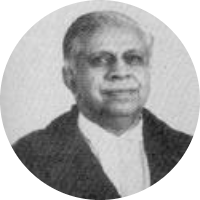M.N Venkatachaliah

M.N Venkatachaliah
Former Chief Justice of India
Assumed Office12th Feb, 1993
Retired On24th Oct, 1994
Previously
Chairman of National Human Rights Commission of India 26th November 1996- 24th October 1999
Judge at the Supreme Court of IndiaOctober 5th 1987 - February 2nd 1993
Permanent Judge of the Karnataka High Court6th November 1975 - October 4th 1987
Profile
Justice Manepalli Narayana Rao Venkatachaliah began his general practice of law in 1951. He became a permanent judge of the Karnataka High Court on 6th November 1975 and was later elevated as the judge of the Supreme Court on 5th October 1987. He became the Chief Justice of India on 12th February 1993, succeeding Chief Justice L. M. Sharma. He served in office for almost 2 years, retiring on 24th October 1994.
After his retirement, he continued to work for anti-corruption and human rights issues. He served as the Chairman of the National Human Rights Commission of India from 26th November 1996 to 24th October 1999. In 2000, he also headed the National Commission to Review the Working of the Constitution.
He received the Rotary Award on Human Rights on 23rd June 2000, and the Padma Vibhushan in 2004.
During his term of seven years at the Supreme Court, he authored 90 judgements and was a part of 482 benches. Throughout his tenure, he was committed to reducing the pendency of cases and making the judiciary more and more accountable. He is credited for bringing down the pendency of cases to 19,000 in his tenure.
Notable Judgements
Following the Bhopal Gas Leak tragedy, several suits were filed against the Union Carbide Corporation (UCC), both in India and in America. In February 1989 the Supreme Court approved a full and final settlement of $470 million which the UCC had to pay to the Union of India and quashed all the civil or criminal proceedings. This decision was met with massive protests by the victims, survivors, their supporters, and activists. The Supreme Court took up review proceedings challenging the settlement order. Justice Venkatachaliah authored the Constitutional Bench judgement in Union Carbide Corporation v. Union of India. The settlement order was upheld justifying it under Article 142 of the Constitution which allowed the court to go beyond the plea and do “complete justice”. However, the criminal proceedings were revived.
Joginder Kumar v. State of UP, also known as the “guidelines for arrest” case, for the first time set standard grounds for arresting any individual. Justice Venkatachaliah elaborated that the police officers could not arrest persons in an abuse of power. He further opined that the officer must be able to justify the arrest/detention with valid reasons, and no arrest could be made without reaching a reasonable satisfaction after some investigation. No person could be denied their liberty merely on “suspicion”. Justice Venkatachaliah also held that the right of an arrested person to inform someone about his arrest and to consult a lawyer was an integral part of Articles 21 and 22(1).
In Sheela Barse v. Union of India, the court took cognizance of a letter sent by the activist Sheela Barse and treated it as a Public Interest Litigation, filed to highlight the gross violation of basic Fundamental Rights of children in custodial detention and jails. Justice Venkatachaliah appointed a Supreme Court Legal Aid Committee. He found the Government of West Bengal “unable to assist the court fully and effectively”, and therefore, appointed the Commission to investigate the issues without any delays.
In Kihoto Hollohan v. Zachillhu And Others, the constitutionality of the Constitution (Fifty-Second Amendment) Act, 1985, (known as the Anti-defection Law) was challenged. All the provisions of the Tenth Schedule were under question, mainly the provision that made the Speaker’s decision final concerning cases of disqualification of MPs or MLAs. Moreover, judicial review was taken away. Justice Venkatachaliah wrote that a Speaker holds a very important position in Parliamentary Democracy, and is the guardian of the rights and privileges of the House. They are expected to make these important decisions and therefore, vesting in them the power to do so must not be seen as unacceptable. However, he clarified and emphasised that judicial review could not be taken away. Decisions of the Presiding Officer would always be subject to judicial review.
Justice Venkatachaliah was also a part of the five-judge bench in Ismail Faruqui v. Union of India, in which the validity of Acquisition of Certain Area at Ayodhya (ACAA) Act, 1993 was challenged. The government had acquired 67.7 acres of land under this Act in and around Babri Masjid. This acquisition of land was upheld by the court saying that it was a step taken to arrest the communal tensions, and therefore, could not be a non-secular act. This judgement also said that Mosque was not an essential part of the practice of Islam, and namaz by Muslims could be offered anywhere.
